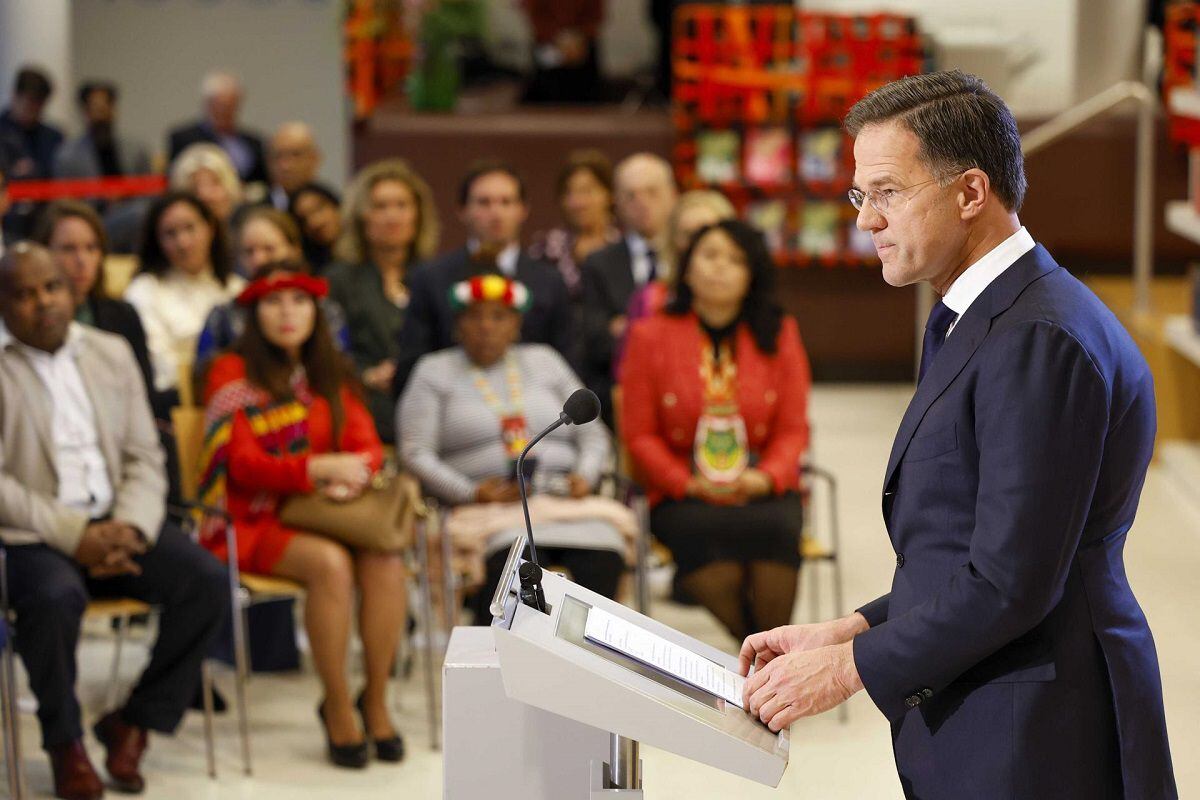The Dutch Prime Minister mark ruttetoday delivered words expected for 150 years by descendants of people enslaved by the Kingdom of Netherlands between 1621 and 1873: “Slavery was a crime against humanity“, Y “I apologize on behalf of the Government” for the role of the Dutch state.
In a speech at the National Archive in The HagueRutte spoke of a system that has inflicted “unspeakable suffering,” making it possible to “condemn and recognize slavery in the clearest terms as a crime against humanity”, a terminology that had not been used before by the government to refer to slavery.
LOOK HERE: Dutch Prime Minister Mark Rutte reportedly targeted by drug gangs
”For centuries, the Dutch state and its representatives have allowed, encouraged, maintained and benefited from slavery. People have been commodified, exploited and abused in the name of the Dutch State (…) Today, on behalf of the Dutch Government, I apologize for the actions of the Dutch State in the past“, he claimed.
Slavery was “a criminal system that has caused untold suffering to untold numbers of people around the world, and continues to affect people’s lives here and now”, stressed Rutte, who considered that the National Archives is the place for this “national soul searching”.
The racism
He admitted that, for a long time, he thought that “it is not possible to take responsibility in a meaningful way” for something that happened in the past and that he did not witness in person, but acknowledged that “he was wrong” because “centuries of oppression and exploitation” still affect societies today.
”In racist stereotypes, in discriminatory patterns of exclusion, in social inequality“, said. Although it is true thatno one alive today is personally guilty of slavery”, the Dutch State “in all its historical manifestations, is responsible for the great suffering inflicted” to enslaved people.
Other representatives of the Dutch government are today in Suriname and six islands in the Caribbean part of the Kingdom of the Netherlands: Aruba, Bonaire, Curaçao, Saint Eustatius, Saba and Sint Maarten. There they will hold meetings with local representatives about these apologies, which Rutte himself has described as a “significant moment.”
The legal slave trade ended in 1814, but it survived in the Dutch colonies until 1873.”More than 600,000 enslaved African women, men and children were shipped to the Americas in appalling conditions by Dutch slave traders (…). They were separated from their families, dehumanized, transported and treated like cattle.”, denounced Rutte.
MORE INFORMATION: The Netherlands confirms that it has a “large number” of people trapped in Afghanistan
This often occurred under the governmental authority of the West India Company, while in Asia between 660,000 and more than 1 million people were trafficked into areas under the authority of the Dutch East India Company between the XVII and XIX.
”The numbers are incredible. The human suffering behind this is even more unimaginable. There are countless stories and testimonies from survivors that prove how cruelty and arbitrariness had no limits in the slave system”, he denounced.

He referred to slave records, “a dry, conflictive enumeration precisely for underlining the absurdity of a system in which one person turned another into merchandise”. Was “such an inhumane and unfair system” that, when it was abolished, those who were financially compensated by the State were “the slave owners” and not the victims.
The controversy
The journey until December 19 has been long, since the organizations that represent the descendants of slaves have been urging them to apologize for years, but the path traveled since the choice of the date (three weeks ago) has been too short, in the eyes of the same organizations, very critical of the haste.
They believe that the date has no special significance and preferred this gesture to be made on July 1, on KetiKoti (breaking of chains), the commemoration of the formal abolition of slavery in Suriname and the Netherlands Antilles in 1863 (although slaves They worked on plantations for another 10 years, until they were no longer legally “under State supervision”)
ALSO SEE: Flight MH17: life sentences for three men accused of shooting down a Malaysia Airlines plane in 2014
They also criticized that the enslaved communities were not involved in the process, nor in the content of the speech.
One of the reasons given by analysts to explain the government’s haste is the March provincial elections, for which the composition of the Senate is also chosen: the government fears that the campaign will cause division in the coalition and that there will not be enough political support for the apologies if they are delayed to 2023.
But Rutte warned today that his intention is not “delete those pages with some apologies“, because “we can’t change the past, only face it”, and assured that the gesture given today is “a comma, not a period“, to him “dialogue, recognition and healing”. Will apologies be accepted?
Source: Elcomercio
I am Jack Morton and I work in 24 News Recorder. I mostly cover world news and I have also authored 24 news recorder. I find this work highly interesting and it allows me to keep up with current events happening around the world.

:quality(75)/cloudfront-us-east-1.images.arcpublishing.com/elcomercio/W4CDTQRNZ5GSPM4NIWA3LE2QMA.jpg)

:quality(75)/cloudfront-us-east-1.images.arcpublishing.com/elcomercio/KL3TR2NEIJA27JT7WUUUSPZLV4.jpg)
:quality(75)/cloudfront-us-east-1.images.arcpublishing.com/elcomercio/U3N3USTRPZFSRBSL4CMEQKH6OY.jpg)

:quality(75)/cloudfront-us-east-1.images.arcpublishing.com/elcomercio/FN3ORYJ6LJCIDBUEIKAXQGBHYY.jpg)
